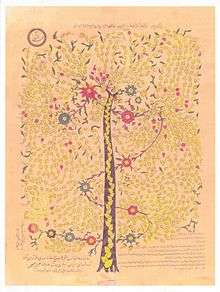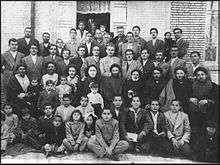Mojabi



The Mojabi Shirazi or Mojabi family (Persian: مجابی, Persian pronunciation: [mojaːbi]) is a prominent Iranian family of cultural significance[1] that originates from Shiraz and later Qazvin, Iran.
Family overview
The Mojabi family governed the religious institutions of Qazvin throughout the 19th and 20th centuries, holding various minbars. The family also had considerable involvement in political and societal affairs. During the late Qajar and Pahlavi eras, the Mojabi family had a significant impact on the periodicals of Qazvin, a city famed for its political newspapers. Of these, Ra’d-i-Qazvin founded and edited by Ali Ra’d Mojabi, was the most long-standing of these periodicals, in print from 1933 to 1950 and was closed down many times by Russian authorities.[2] During this period Ra'd was one of the most renowned periodicals throughout Iran.[3]
Another newspaper, Salah-i-Bashar, founded and edited by Naguib Mojabi, ran from 1924 to 1934. Hojatoleslam Naguib ran the weekly journal with the assistance of Mirza Abutorab Sheikholeslami and Mirza Hossein Khayal.[4] The most significant of the periodicals during the Pahlavi I (Rezā Shāh) era was the Bazpurs, which was in print for 12 years (1924-1936), owned and edited by Jafar Adib Mojabi. The focus of the Bazpurs was on societal issues.[2] Other newspapers run by the Mojabi family included Nakhl-e Omid, Sarnevesht and Saadat Qazvin.
Origin
The family name derives from Ibrahim al-Mujab, more commonly known as Mojab. He was the son of Mohammad al-Abid and grandson of Musa al-Kadhim. Those related to Mojab are therefore known by the surname Mojabi or descedants of Mojab.[5] Mojab is buried in Imam Husayn Shrine, Karbala.[6]
Members of the family are directly descended from the 7th Shia Imam Musa Al-Kadhim who is the son of Ja'far al-Sadiq son of Muhammad Al-Baqir son of Ali Zayn al-Abidin son of Husayn ibn Ali son of Ali Bin Abi Talib and the son of Fatimah the daughter of the Islamic prophet, Muhammad. Members of the family are called with the title Seyed which literally means Mister or Sir. As an honorific title, it denotes males accepted as the direct descendants of Muhammad.
List of Notables
- Ali Ra'd Mojabi, owner and editor of Ra'd newspaper in Qazvin.[7]
- Fathollah Mojab (born 1932), paleontologist.
- Ayatollah Gholamhossein Mojabi, cleric.
- Ayatollah Ali Mojabi, cleric.
- Hossein Mojabi (1944-1964), painter.
- Ibrāhīm Mojāb (c. 8th century), grandson of Musa al-Kadhim.
- Ayatollah Jafar Adib Mojabi (1895-1967), cleric, author and owner of Bazpurs newspaper.[8]
- Javad Mojabi (born 1939), writer, poet, literary and art critic.[9]
- Mohammad Mojabi (born 1965), politician and environmentalist.[10]
- Puyan Mojabi, University of Manitoba professor.[11]
- Ayatollah Rahmatollah Mojabi, cleric.
- Shamseddin Mojabi (1939–2012), academic, government adviser and political activist.[1]
- Shahrzad Mojab (born 1956), University of Toronto professor.[12]
- Yahya Mojabi, traditional musician from the Qajar era who trained under Abdulkarim Jenab Qazvini.[13]
- Zohreh Mojabi (born 1960), actress and playwright.[14]
- Ayatollah Sultan al-Wa'izin Shirazi (1894-1971), Shia scholar and author of Peshawar Nights.
References
- 1 2 "بازخوانی زندگی سیاسی و اجتماعی مرحوم دكتر شمس الدین مجابی". goodbook.blogfa.com. 2014-04-05. Retrieved 2014-04-05.
- 1 2 Haddad Adel, Gholamali; Elmi, Mohammad Jafar and Taromi-Rad, Hassan eds. Periodicals of the Muslim World: An Entry from Encyclopaedia of the World of Islam. EWI Press, 2012, p. 84.
- ↑ "۵- هفته نامۀ "رعد قزوین"". Hassan Shakibzade. Retrieved 2014-07-12.
- ↑ Hassan Shakibzade. "۹- هفته نامۀ "صلاح بشر"". shakibzade.com. Retrieved 2014-05-27.
- ↑ "خاندان". goodbook.blogfa.com. 2014-04-05. Retrieved 2014-04-05.
- ↑ "History of Kerbala province and most significant libraries and religious schools". Imam Hussein Holy Shrine. 2012-11-01. Retrieved 2014-04-05.
- ↑ "حجه الاسلام حاج سید جعفر ادیب مجابی قزوینی (سرسلسله خاندان)". ArtQazvin.ir. Retrieved 2014-04-05.
- ↑ "حاج سید جعفر ادیب مجابی". IRIB. Retrieved 2014-04-05.
- ↑ "Javad Mojabi - Iranian Writer & Poet". Caroun.com. 2014-04-05. Retrieved 2014-04-05.
- ↑ "مجابی به سمت معاون توسعه مدیریت، حقوقی و امور مجلس محیط زیست منصوب شد". Fars News. Retrieved 2014-04-05.
- ↑ "Puyan Mojabi". umanitoba.ca. 2014-04-05. Retrieved 2014-04-05.
- ↑ "Shahrzad Mojab". University of Toronto OISE. 2014-04-05. Retrieved 2014-04-05.
- ↑ "گفتگو با دکتر حسین میثمی نویسنده کتاب "موسیقی کلاسیک در قزوین"". IRICAP.com. Retrieved 2014-04-16.
- ↑ "Zohreh Mojabi". IMDB. 2014-04-05. Retrieved 2014-04-05.
Further reading
- Golriz, Mohammad Ali (1958). The Paradise Gate of Qazvin. Tehran: University of Tehran Press. (Persian: مينودر: ياباب الجنه قزوين)
- Shirazi, Sultan al-Wa'izin (1971). Peshawar Nights. Tehran. (Persian: شبهای پیشاور)